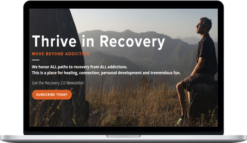NICABM – Frontiers In The Treatment Of Trauma
$397.00 $77.00
»Delivery: Within 24hs
Description
NICABM – Frontiers In The Treatment Of Trauma
The Right Treatments, Applied Skillfully and Timed Correctly, Make Healing from Trauma Faster and More Effective
This comprehensive training program will help you identify the best practices – and develop the skills you need to help clients take back their lives.
What if you could cut through all the theory and the thousands of research articles and quickly identify specific interventions that could help your patients heal?
Imagine boiling the latest developments down to clear, simple principles you could implement after just minutes of study. This program will get you there.
This comprehensive training program will help you identify the best practices – and develop the skills you need to make your treatments even more effective.
Each session in this comprehensive training program is designed to get you up-to-date with the latest thinking in the treatment of trauma, giving you new perspectives and expanding your toolkit.
Why does Bill O’Hanlon take part in the program?
Here’s A Look At What You’ll Get In Frontiers In The Treatment Of Trauma
Getting to the Root of Trauma: Why It’s Critical to Understand the Role of Memory in Trauma Therapy
Peter Levine, PhD
Creator of Somatic Experiencing, Director of The Somatic Experiencing Trauma Institute, author of In An Unspoken Voice: How the Body Releases Trauma and Restores Goodness
- Strategies that Can Help Your Clients Build Resilience Against Traumatic Experiences
- How Trauma Cascades from One Generation to the Next
- Working through the Unintended Consequences of Western Bias in Trauma Therapy
- How to Help Trauma Survivors Revisit Memories without Becoming Stuck in Them
- What Animal Reactions (to Trauma) Can Teach Us About Helping Clients Cope with PTSD
- How Different Types of Memory Can Contribute to the Traumatic Experience
- Reliving and Revisiting: A Useful Strategy that Can Help Your Clients Work Through Trauma with More Stability and Presence
How to Help Patients Rewire a Traumatized Brain – Applying the Latest Strategies to Speed Healing and Reduce Symptoms for Even the Most Traumatized Clients
Bessel van der Kolk, MD
Co-author of Traumatic Stress: The Effects of Overwhelming Experience on Mind, Body, and Society, Medical Director of the Trauma Center at Justice Research Institute, Faculty at Boston University Medical School
- Why PTSD and Developmental Trauma Require Vastly Different Treatment Strategies
- Why Diagnosis Matters: How Misdiagnosed Bipolar Disorder Can Mask Trauma and Lead to the Wrong Intervention
- Neglect and Trauma: Unique Problems that Often Go Hand in Hand
- Why Blocking the Dopamine System Knocks Out Children’s Capacity to Engage and Be Motivated
- Why Childhood Trauma is More Complex Than We Think
- How PTSD Affects a Parent’s Ability to Respond to Their Own Children
- Mindfulness: The Sine Qua Non of Psychotherapy
- Integrating Yoga and Meditation During Trauma Treatment
Why a Body-Oriented Approach Is Key for Treating Traumatized Patients (and What It Looks Like in Practice)
Pat Ogden, PhD
Author of Trauma and the Body, Founder & Director of The Sensorimotor Psychotherapy Institut
- Uncovering Root Causes – The Long-Term Effects of Attachment Issues
- The Big Things We Miss When We Forget the Body
- Work in the Now: Why the Present is So Important
- How Trauma Sounds: Interpreting Prosody
- How to Capture Fleeting Bodily Expressions
- How Interoceptive Awareness Becomes Compromised and Why this Matters
- Building the Resources that Stabilize Arousal/li>
Beyond the Brain: Using Polyvagal Theory to Help Patients “Reset” the Nervous System after Trauma
Stephen Porges, PhD
Author of The Polyvagal Theory, Professor at University of Illinois at Chicago
- Why the Face is the Window to Our Internal State
- What Makes the Human Vagus Unique?
- How Our Nervous System Reacts to Another Person’s Voice
- The Important Physiological Component of Intuition
- How Our Personal Narratives Originate in Our Bodies
- How Trauma Changes Our Ability to Adapt to the World
- Why Educating Clients Creates the Ability to Transform the Brain
The Power of EMDR to Treat Trauma: Identifying, Reprocessing, and Integrating Traumatic Memories
Francine Shapiro, PhD
Originator of EMDR therapy, Director of the EMDR Institute, Author of Getting Past Your Past: Take Control of Your Life with Self-Help Techniques from EMDR Therapy.
- How Clients Get “Stuck” in Traumatic Memories
- Why EMDR is Different
- The Surprising Link Between Sleep and Trauma Treatment
- Bilateral Stimulation: The Key to Finding Refuge
- Creating Safety in Practice
- Why PTSD is Complicated by Feelings of Failure
- Transforming Trauma to Resilience
- Important Outcomes with Sexual Perpetrators
- How Chronic Pain Can Be Caused by Unprocessed Memories
The Neurobiology of Trauma – What Is Happening in the Brain of Someone With Unresolved Trauma
Ruth Lanius, MD, PhD
Co-Editor of The Impact of Early Life Trauma on Health and Disease, Faculty at University of Western Ontario
- Why Insecure Attachment Can Increase Vulnerability to Trauma
- The Effect of Early-Life Trauma on the Brain’s Default Mode Network
- The Neurobiology of Parent/Child Interactions: A Look at Emerging Research
- Bringing the Default Mode Network Back Online: Why Mindfulness Can Be Key
- Creating Safety in Practice
- A New Look at the Link Between Trauma and Direct Eye Contact
- The Neurobiology of Dissociation: What We’ve Learned in the Past Year
- The Inability to Process Pleasure: Finding Answers to Anhedonia
- How Trauma Reduces Our Capacity for Insight and Self Reflection
About NICABM
We proudly provide continuing education for practitioners who are dedicated to being the best in their craft. Our goal is to develop programs that connect you with the top experts and the latest strategies in the field, to help you achieve better outcomes, more quickly with each of your clients.
More courses from the same author: NICABM
Delivery Policy
When will I receive my course?
You will receive a link to download your course immediately or within 1 to 21 days. It depends on the product you buy, so please read the short description of the product carefully before making a purchase.
How is my course delivered?
We share courses through Google Drive, so once your order is complete, you'll receive an invitation to view the course in your email.
To avoid any delay in delivery, please provide a Google mail and enter your email address correctly in the Checkout Page.
In case you submit a wrong email address, please contact us to resend the course to the correct email.
How do I check status of my order?
Please log in to HealingCourse account then go to Order Page. You will find all your orders includes number, date, status and total price.
If the status is Processing: Your course is being uploaded. Please be patient and wait for us to complete your order. If your order has multiple courses and one of them has not been updated with the download link, the status of the order is also Processing.
If the status is Completed: Your course is ready for immediate download. Click "VIEW" to view details and download the course.
Where can I find my course?
Once your order is complete, a link to download the course will automatically be sent to your email.
You can also get the download link by logging into your HealingCourse account then going to Downloads Page.
Related products
Total sold: 3










